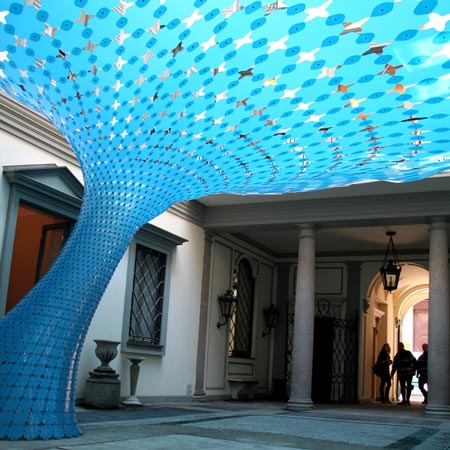Live from Milan: architects and designers Christoph Klemmt, Ran Ankori, Maya Carni, Francesco Brenta, Laura Micalizzi and Elisa Oddone have created Project Or, a vortex-shaped installation in a courtyard in Milan that reacts to sunlight.
The installation is made up of photo-reactive segments that are translucent when in the shade but coloured when exposed to sunlight.
Here's some more info from the designers:
--
OR is the boldest installation at the Milan International Furniture Fair 2008, a vortex-shaped surface which reacts to sunlight. The polygonal segments of the surface react to ultra-violet light, mapping the position and intensity of solar rays. When in the shade, the segments of OR are translucent white. However, when hit by sunlight they become coloured, flooding the space below with different hues of light. At night, OR transforms into an enormous 'chandelier', disseminating light into the surrounding courtyard, an atmospheric space for events and gatherings.
The hues generated by the photoreactive surface are therefore indicators of changes in weather and daylight, a dynamic architectural tool that can be used on building exteriors. OR is skin, OR is shining, OR is the light OR the shade.
OR is the first time that photoreactive technology has been used on an architectural scale. The ecological structure is a step in exploring the possibilities of photoreactive materials in the fields of furniture and design. The beauty of OR is its constant interaction with the elements. Each moment of the day is unique.
The project was developed by the architects and designers Ran Ankori, Francesco Brenta, Maya Carni, Christoph Klemmt, Laura Micalizzi and Elisa Oddone. Projects by the London-based team have been featured in key architectural magazines such as “Domus” and “Blueprint” and in international newspapers such as the “Financial Times”. For the 2007 International Milan Furniture and Design Fair we have exhibited Aquagarden, which attracted large crowds of visitors and was published in Domus and Financial Times.

